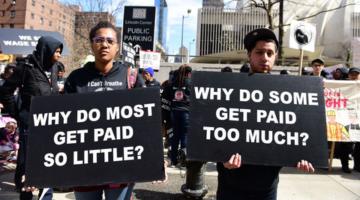Malaika Jabali’s book explains our toxic relationship with capitalism and says it’s time to break up.
The outcome of this election seems like a grim corporate triumph, with Elon Musk, the world’s richest man, crowing every day, acting as though he’s the de facto president. Green Party candidate Dr. Jill Stein won only .5 percent of the popular vote compared to 1.07 percent in 2016.
However, reading Malaika Jabali’s It’s Not You, It’s Capitalism: Why It’s Time to Break Up and How to Move On can make you think there’s still hope for America. She cites a 2021 Axios/Momentive poll of American adults which showed that favorable reactions to the term capitalism have gone way down since 2019, while reactions to the word socialism became more positive. Socialism had positive connotations for 52 percent of Black Americans, 49 percent of Latinos, and 33 percent of white Americans, and young adults had a steep drop in their positive views of capitalism.
Much of Jabali’s book is devoted to capitalism’s history and analysis of what it is, an ever more brutal system in which those with investment capital seek maximum returns on anything they can privatize, from slave labor to student debt, regardless of consequences for people or the planet. Capitalism has relied on inequality from the first European factories to American slave plantations to the extremes we see today. “In the 1700s,” she writes, “when the US had an economy built on the labor of literal enslaved people who had no income, income inequality then was still not as bad as it is today. Mind. Blown.”
She explains how people of color, especially Black people, have suffered the worst outcomes in employment, housing, health care, and education.
Time to break up
Jabali analogizes our relationship to capitalism to a bad relationship with an abusive partner who keeps taking, taking, taking all your time, your talents, and your love without ever giving anything back. “And if we ask for anything back, and they oblige occasionally, it’s like they’re doing us a huge favor. And of course they’ll hold it over our heads forever.”
For anyone who’s ever been in an abusive relationship, including me, this book can be at times a difficult read for that reason, but the analogy is very effective. It is particularly couched in the language of millennials and beyond, relying particularly on the “Swipe Left” and “Swipe Right” figures of speech drawn from dating apps in which one swipes right to indicate attraction and interest in another date seeker and swipes left to indicate disinterest.
Why, she asks again and again, do we keep swiping right for capitalist abuse? In a chapter on the debt industry, she writes, “There’s a whole crew of lending bloodsuckers trying to match with us. Swipe left!”
In some of the many engaging graphics that make this book very readable, she presents these vampire dating app profiles of lenders:
STUDENT LOAN VAMPIRE
ABOUT ME
I will be with you forevvverrr.
Can’t get rid of me baby!
My love for you will just grow
and grow.
I just have a lot of interest
in you okay? I may stalk you
and hound you for money, no
matter where you move.
CREDIT CARD VAMPIRE
ABOUT ME
I’ll be with you wherever you
turn looking for commitment.
Yeah, I know we just met.
I’ll charge a lot for you to be
with me. It’s kind of criminal
actually.
You make one little mistake
and I’ll hold it against you for a
really really long time.
JAIL VAMPIRE
ABOUT ME
I have a thing for men of color.
It’s not a fetish, I promise . . .
it’s just a preference.
If you can’t pay me back, you’ll
barely see the light of day
PAYDAY LOAN VAMPIRE
ABOUT ME
I know your main chick isn’t giving
you what you deserve, so I’ll help
you out . . . but it’ll cost ya.
You can hit me up last minute
when you’re in a pinch, but of
course I’ll charge a premium.
I know my worth!
I’m kind of low-key, so I get
away with a lot.
Jabali asks why we keep swiping right on these vampires, but of course, in many cases, we have little choice. If someone’s been arrested and neither they nor their family can make cash bail, they’ve got no choice but to turn to a bail bondsman. If someone can’t get an education without taking out student loans, they’ve got no choice.
However, we collectively have the power to fight back against these bloodsucking lenders and other bloodsucking capitalist institutions. One example Jabali cites is Debt Collective, a debtors’ union which claims to have abolished more than $100 billion in student debt, medical debt, payday loans, probation debt, and credit card debt.
Capitalism is, as Jabali so clearly elucidates, an evil, soul-crushing, resource-ravaging, planet-destroying institution, but this book isn’t a downer. It’s not only engaging, but also solution oriented. She spends as much time describing this and other creative organizing to free ourselves from capitalism as she spends describing its most hideous manifestations.
What is socialism? Many Americans, as evidenced by the 2021 Axios/Momentive poll, like the idea. Most, however, need help imagining what it does and doesn’t mean, and Jabali’s book offers an abundance of that help.
It doesn’t mean that the state will come to take your house, your car, and your freedom. That’s what capitalist propagandists have been telling you, Jabali explains.
Nor does it mean, as Marx and Engels once imagined, that the working class will become more and more homogeneous and immiserated until they rise up to seize the state and the means of production. Although claiming state power might someday be the final achievement of effective socialist organizing, many forms of creative, on-the-ground, decentralized organizing are the order of the day.
One example Jabali cites is the Republic of New Africa founded by Black people, whose families once migrated out of the South to places like Detroit and Chicago, who decided to return to their roots in the Deep South and make Jackson, Mississippi, their headquarters. RNA members also founded the Malcolm X Grassroots Movement, which organizes around people’s assemblies, and Cooperation Jackson, which “envisions the Southern city with a solidarity economy consisting of a network of cooperative and mutually reinforcing enterprises and institutions, specifically worker, consumer, and housing cooperatives, and community development credit unions.’”
The Jackson Plan is the best known of similar efforts around the US, such as the Oakland-based East Bay Permanent Real Estate Cooperative (EBPREC). The organizers of these efforts often cite the federated Mondragon Workers’ Cooperatives of Spain’s Basque Region.
Jamal explains other collective, anti-capitalist organizations such as:
Community Land Trusts in Vermont, California, and to create housing that is not commodified; the growing movement to create banks that are owned by and benefit the people, manifested in the Public Banking Institute and New York City’s New Economy Project; the energy democracy movement, manifested in the Energy Democracy Project, which seeks to replace private energy utilities with public power in the interests of people and the planet.
Another way to jump into the struggle is running for public office, particularly at the local level. Jabali cites the example of her godfather, Charles Barron, socialist, former Black Panther, and former longtime New York City Council member. “After over twenty years of serving in state and local government,” she writes, Barron’s focus is now “to lift up a new generation of Black radical politicians.”
Returning to the relationship analogy that runs throughout her book, Jabali concludes, “Socialism may not complete us and sweep us away in some whirlwind romance. But it may give us the comfort we haven’t felt since capitalism forcefully weaseled its way into our lives. We owe it to ourselves, and future generations who are hoping for a habitable planet, to at least step out and give some other prospects a chance.”
Ann Garrison is a Black Agenda Report Contributing Editor based in the San Francisco Bay Area. In 2014, she received the Victoire Ingabire Umuhoza Democracy and Peace Prize for her reporting on conflict in the African Great Lakes region. She can be reached at ann@anngarrison.com. You can help support her work on Patreon.



















